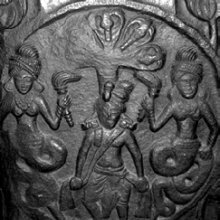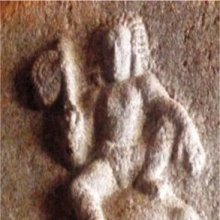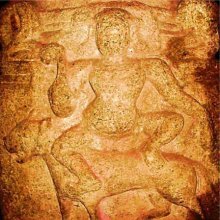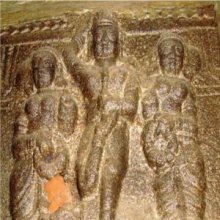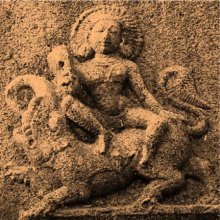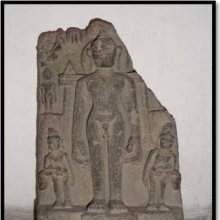Fly-whisk: 2 definitions
Introduction:
Fly-whisk means something in Jainism, Prakrit, the history of ancient India. If you want to know the exact meaning, history, etymology or English translation of this term then check out the descriptions on this page. Add your comment or reference to a book if you want to contribute to this summary article.
Images (photo gallery)
(+7 more images available)
In Jainism
General definition (in Jainism)
Source: Singhi Jain Series: Ratnaprabha-suri’s Kuvalayamala-kathaFly-whisk refers to one of the various attributes held by the Eight auspicious Girls (representing the eight celestial nymphs of Indra’s heaven) (also: aṣṭakanyā), according to Uddyotanasūri in his 8th-century Kuvalayamālā (a Prakrit Campū, similar to Kāvya poetry).—Page 93.17-8: There is a list of Eight auspicious girls holding respectively sprouted water-jars, fan-palm, fly-whisk, parasol, mirror, mṛdaṅga, harp, drum and cloth and ornaments. These were regarded as eight celestial nymphs of Indra’s heaven and frequently referred in literature as aṣṭakanyā or sabhā-kanyā. [...]

Jainism is an Indian religion of Dharma whose doctrine revolves around harmlessness (ahimsa) towards every living being. The two major branches (Digambara and Svetambara) of Jainism stimulate self-control (or, shramana, ‘self-reliance’) and spiritual development through a path of peace for the soul to progess to the ultimate goal.
India history and geography
Source: Singhi Jain Series: Ratnaprabha-suri’s Kuvalayamala-katha (history)Fly-whisks were commonly traded with foreign merchants in ancient India, according to Uddyotanasūri in his 8th-century Kuvalayamālā (a Prakrit Campū, similar to Kāvya poetry).—The Kuvalayamala (779 A.D.) is full of cultural material which gains in value because of the firm date of its composition. [...] At Sūrpāraka there was a guild of local merchants. It was their custom to hold a reception in honour of merchants from outside and to learn from them the country of their origin, the destination, field of trade, the nature, value and volume of commodity in which he is interested and all such matters relating to his business. [...] One said: “I went with pearls to the eastern country (probably Assam) and brought fly-whisks”. [...]

The history of India traces the identification of countries, villages, towns and other regions of India, as well as mythology, zoology, royal dynasties, rulers, tribes, local festivities and traditions and regional languages. Ancient India enjoyed religious freedom and encourages the path of Dharma, a concept common to Buddhism, Hinduism, and Jainism.
See also (Relevant definitions)
Full-text (+42): Camara, Sahamsavalavyajana, Iyotti, Cirralavattam, Indira, Shodashopacara, Camara-kumara, Caturashra, Peacock feather, Dharanidevi, Camaragraha, Halo, Camarika, Govinda, Bhamandala, Heavenly flower, Khendra, Shalabhanjika, Eight girls, Eight nymphs.
Relevant text
Search found 20 books and stories containing Fly-whisk; (plurals include: whisks). You can also click to the full overview containing English textual excerpts. Below are direct links for the most relevant articles:
Pallava period (Social and Cultural History) (by S. Krishnamurthy)
Other employers in a royal court and palace < [Chapter 3 - Socio-Religious Life]
Characteristics of people (during the Pallava period) < [Chapter 4 - Material Culture of the People]
Coronation of the King < [Chapter 3 - Socio-Religious Life]
Jain Remains of Ancient Bengal (by Shubha Majumder)
Caubisi type of Candraprabha sculptures < [Chapter 6 - Iconographic Study of Jaina Sculptural Remains]
Pañca-tīrthika type of Candraprabha sculptures < [Chapter 6 - Iconographic Study of Jaina Sculptural Remains]
Single depiction of Mahāvīra sculptures < [Chapter 6 - Iconographic Study of Jaina Sculptural Remains]
Trishashti Shalaka Purusha Caritra (by Helen M. Johnson)
Part 1: Daśārṇabhadra < [Chapter X - Stories of Daśārnabhadra, Śālibhadra and Dhanyaka]
Part 5: Initiation of Mahāvīra < [Chapter II - Mahāvira’s birth and mendicancy]
Notes on Atiśaya (supernatural powers) < [Notes]
Kathasaritsagara (the Ocean of Story) (by Somadeva)
The use of a chowry (fly-whisk) in ancient India < [Notes]
Chapter LV < [Book IX - Alaṅkāravatī]
Appendix 1.4 - Sacred Prostitution < [Appendices]
Jainism in Odisha (Orissa) (by Ashis Ranjan Sahoo)
Santinatha image at Amrutesvara Temple, Tala Beguniapada < [Chapter 3: Survey of Jaina Antiquities in Odisha]
Parsvanatha image at Dahikhai Thakurani, Tentulidiha < [Chapter 3: Survey of Jaina Antiquities in Odisha]
Jagulei Gramadevati, Bansabadi < [Chapter 3: Survey of Jaina Antiquities in Odisha]
Amaravati Art in the Context of Andhra Archaeology (by Sreyashi Ray chowdhuri)
Mahilāmukha Jātaka < [Chapter 3 - Amarāvatī and the Formative Stage of the Buddhist Art]
The Dhamma Wheel < [Chapter 3 - Amarāvatī and the Formative Stage of the Buddhist Art]
Mandhāta Jātaka < [Chapter 3 - Amarāvatī and the Formative Stage of the Buddhist Art]
